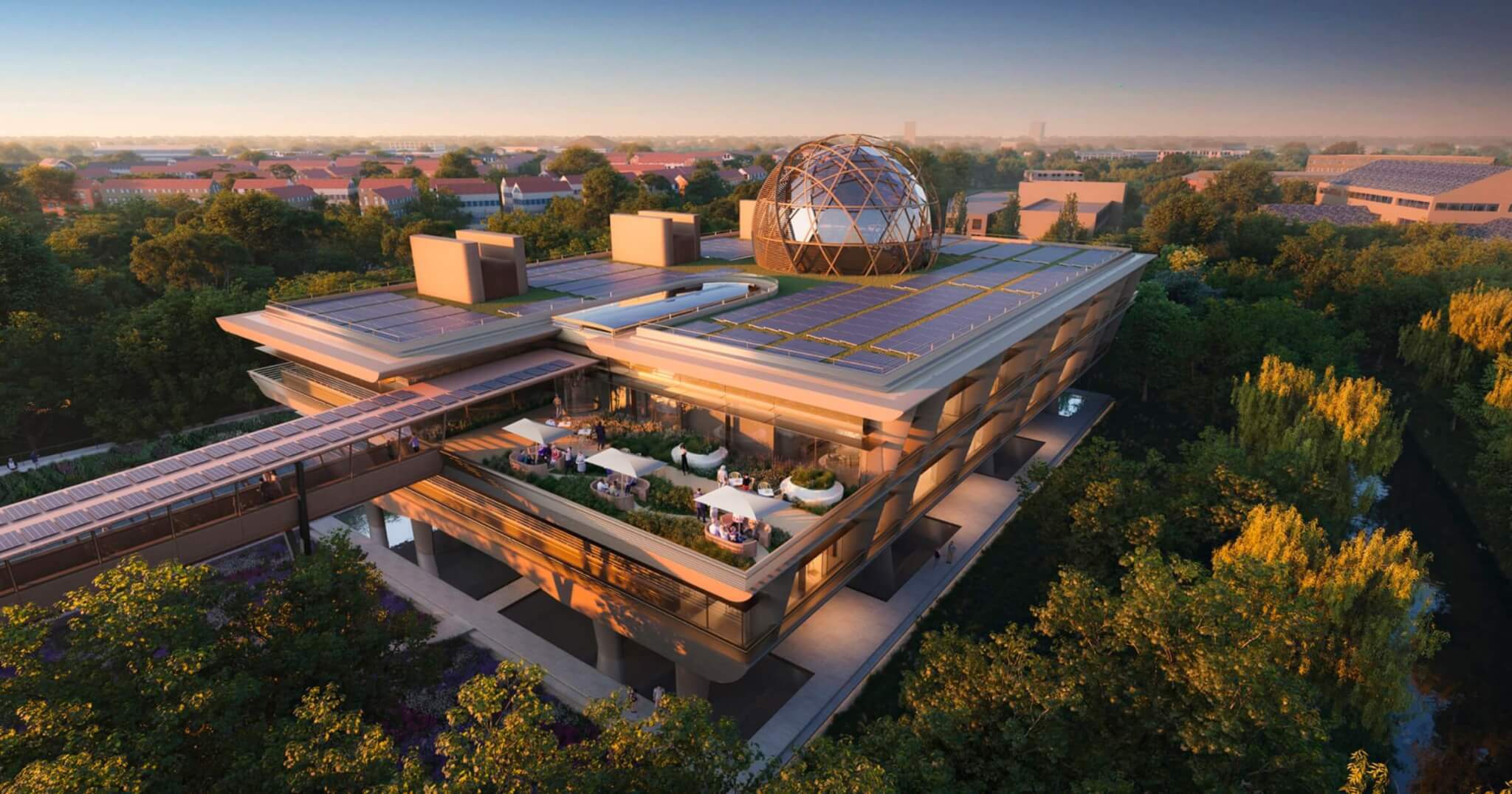For Foster + Partners, integrating responsible design, sustainability, and state-of-the-art engineering enables them to remain a top globally recognized architecture firm. Some of the most notable foster and partners projects include the Bilbao Fine Arts Museum, One Bloor West, and the Palm Flower. The company even fosters career opportunities for new graduates in the AEC space. In this article, we’ll explore some of the firm’s biggest and most awe-inspiring designs.
Foster + Partners: Blending technology and research with world-class engineering
Foster + Partners is a global architectural design and engineering firm. Founded by Norman Foster in 1967, the company is known for high-tech operations and sustainable building design. They have offices in London, Abu Dhabi, Beijing, Bangkok, Los Angeles, New York, Madrid, Sydney, Warsaw, and more.
Fields of expertise include architecture, industrial design, interiors, urban and landscape design, and workplace consultancy. They’ve received countless awards and accolades, and Foster + Partners credits its ability to stay current partially to dedicated, deep research from their Materials Research Centre. Some of the most iconic projects from Foster + Partners include the Gherkin in London, the Hearst Tower in New York City, and the Millau Viaduct in France.
Here, we’ll take a look at some of the recently completed or under construction projects notable to their area and the broader architecture industry.
10 past, present, and future projects on the go from Foster + Partners
1. Palm Flower
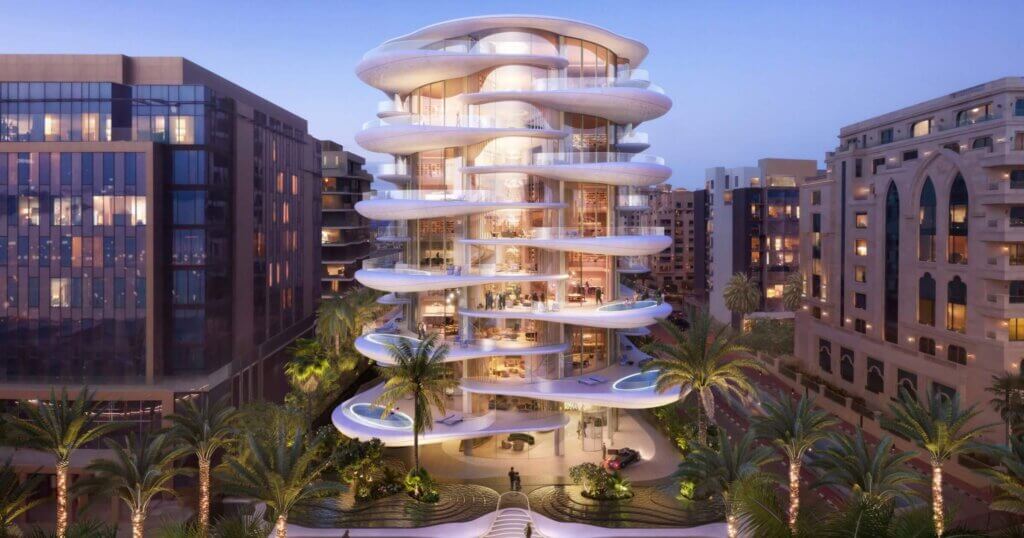
- Location: Dubai, United Arab Emirates
- Year completed: 2026
- Typology: Residential
Dubai’s Palm Flower might be the most visually striking on our list, with large white “petals” on the exterior of the building, supporting each unit’s private pool. The largely glass exterior shows off the expansive living spaces, and inside, residents can enjoy their own private elevator taking them from the double-height lobby right to their unit.
This is the last project plot to be finished within the Palm Jumeirah district, making it one of the most sought-after buildings in the city. The building’s basement features bespoke lighting for each resident to show off their car collections, and lounge areas, water features, and a library take up the other shared spaces.
2. Legacy of Bodegas Faustino Winery
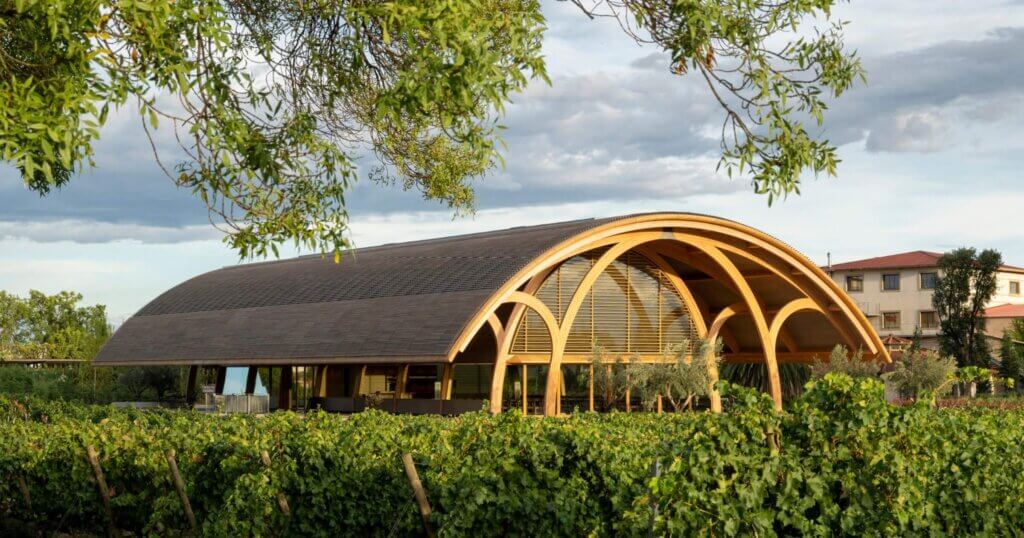
- Location: Oyón, Spain
- Year completed: 2024
- Typology: Hospitality
Located in the heart of Spain, the Legacy of Bodegas Faustino Winery is the newest extension to the main winery in Oyón, Rioja Alavesa. This project includes a refurbishing of the original structure, and the extension will include a new visitor center, better connecting the existing wine cellars with the surrounding vineyard. The main entrance was intentionally moved with the completion of this project, so visitors first encounter the rolling vineyard before entering inside, blending sustainability, nature, culture, and design.
The visitor center expansion features a column-free hall with a vaulted ceiling with timber arches, inspired by the industrial heritage of the area. This energy-efficient build is also designated as a ‘Planet 1.0’ building, meaning its carbon emissions can be easily absorbed, and the photovoltaic panels on the roof produce more energy than is consumed. Underutilized structures identified in the refurbishment have been removed to provide more optimal future scaling for the client’s wine-making operations.
3. Changfeng Mixed Use Development
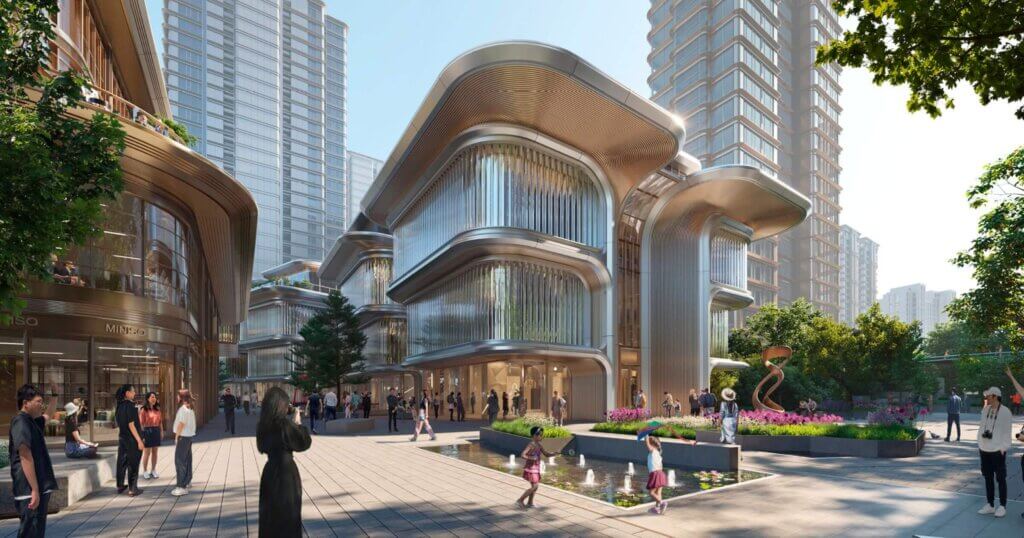
- Location: Shanghai, China
- Year completed: 2035
- Typology: Mixed Use
The bustling Putuo District will soon be home to the completed Changfeng Mixed Use Development, a mixed-use building part of a wider Shanghai Masterplan on a backdrop of public green spaces and open waterways. This project was built around the concept of a “15-minute community Life Circle,” meaning services and daily essentials like retail, offices, public facilities, and recreational areas, and accessible to all residents within a 15-minute walk.
A main axis runs north to south, connecting two primary “nodes,” while smaller streets connect additional facilities. A flexible arts center with 5000m² of art and education spaces will be featured in the center, and offices are located to the north, serving as a new landmark on the bustling Jinshajiang road. Residential buildings will be located on the opposite side, south of the arts center, to facilitate a more peaceful, nature-focused environment.
4. Carrington Training Complex
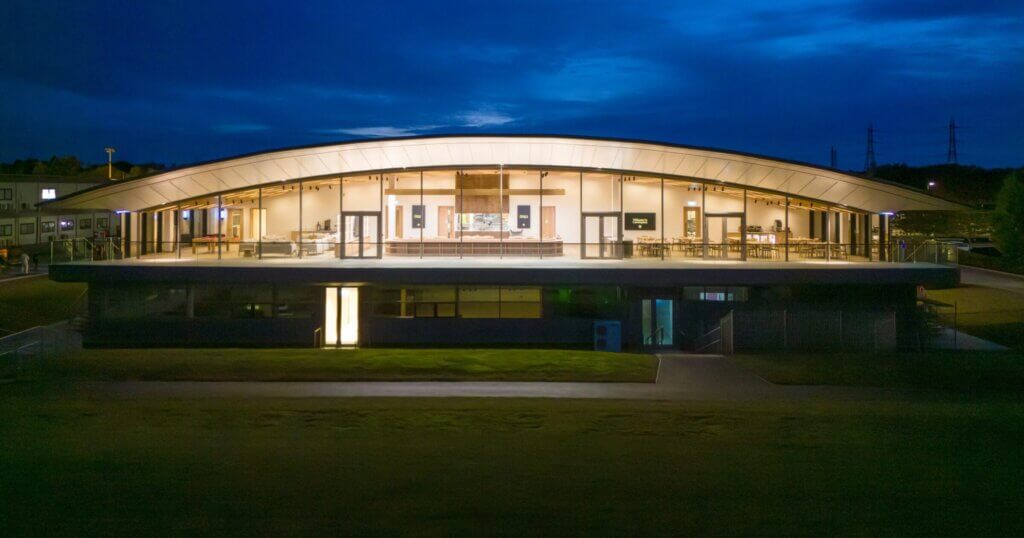
- Location: Manchester, United Kingdom
- Year completed: 2025
- Typology: Sports & Venues
Manchester’s Carrington Training Complex has received a recent upgrade from the 1999 build. The goal is to create a high-performance environment that inspires more collaboration between players and team staff. The structure was largely untouched, but the envelope was modernised with large windows and updated rooflights, bringing natural light inside. New timber paneling was added to the interior to make the space feel natural, open, and timeless.
The ground floor of the facility has a nutrition and hydration space, hydrotherapy pools, and a new gym wth an altitude room. There’s a new outdoor terrace offering expansive views of the pitches, and the latest dining and media rooms support player nutrition and press briefings. The new facility also has a separate player entrance, making it easier for athletes to flow from a designated car park right to their dressing rooms.
5. Bilbao Fine Arts Museum
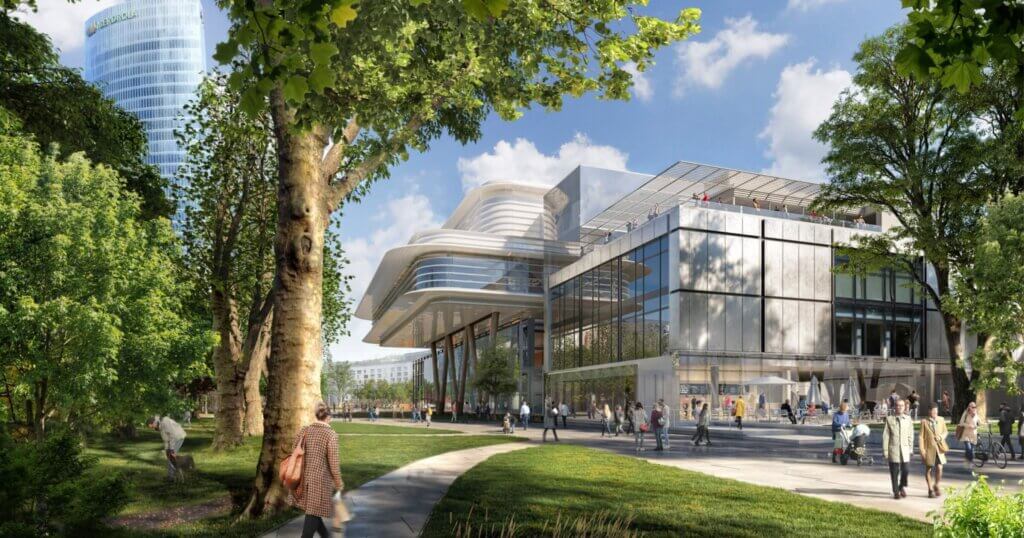
- Location: Bilbao, Spain
- Year completed: 2025
- Typology: Cultural Facility
One of Foster + Partner’s most stunning projects in 2025 is the Bilbao Fine Arts Museum. The design is aimed at expanding Doña Casilda de Iturizar Park, creating a new pedestrian track between the existing museum and the rest of the city. The project itself is situated between the 1970 and 1945 buildings, and will feature 2,000 square meters of gallery space on one spacious floor.
This fine arts museum will have natural light filtered through the skylights, which can be adjusted to better suit the current displays. The mezzanine will contain workshops and educational rooms, and the upper floors will have viewing terraces to make use of its slender space. This project is a blend of the area’s urban sensitivity, architectural quality, and social responsibility.
6. One Bloor West
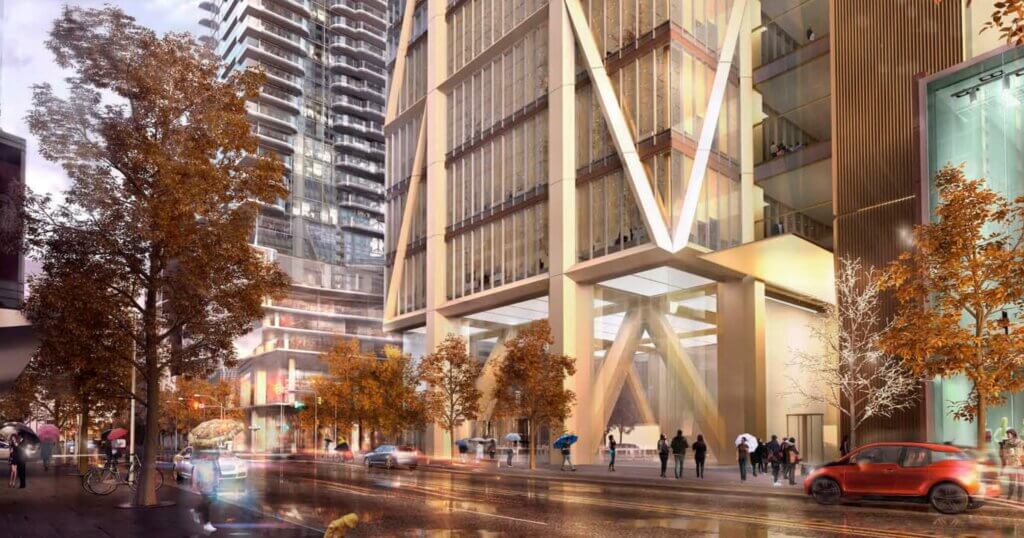
- Location: Toronto, Canada
- Year completed: 2025
- Typology: Mixed use
Soon to be the second-tallest man-made structure in Canada, the One Bloor West building in downtown Toronto will border downtown and the highly fashionable Yorkville. The mixed-use tower will have commercial units in its lower levels, with residential units above. Further up, the building will be topped with duplex penthouses.
This tower’s envelope will showcase distinctive diagonal, horizontal, and vertical champagne-bronze framing elements, making it a striking addition to the city’s skyline. Residents can expect consistent luxurious 620 square-foot floor plans with flexible configurations, many of which have sweeping views of Lake Ontario.
7. Ellison Institute of Technology campus
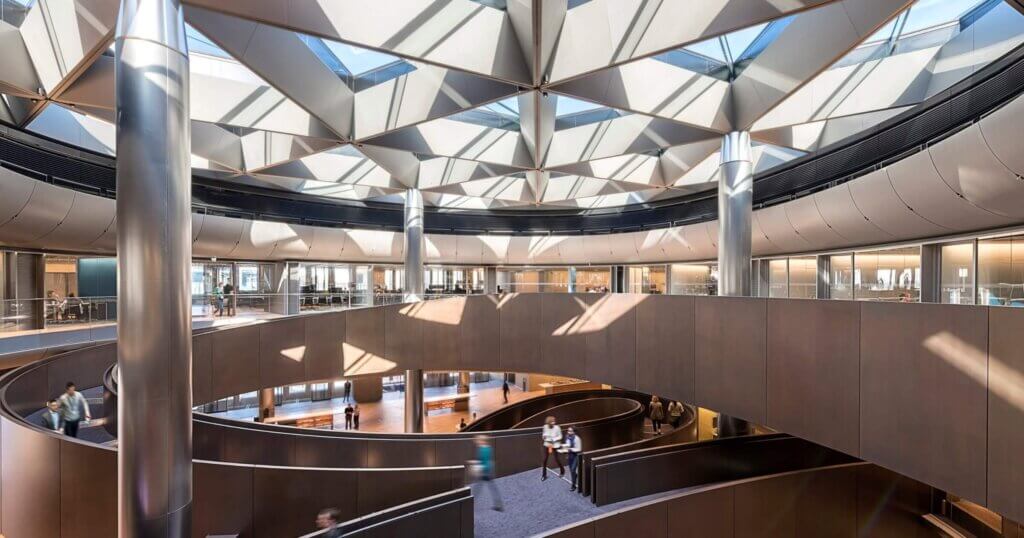
- Location: Oxford, United Kingdom
- Year completed: 2027
- Typology: Education & Healthcare
The new Ellison Institute of Technology campus is a sustainable development, featuring more than 30,000 square meters of research laboratory space, a wellness and oncology clinic, and many meeting and classroom spaces. The historic Littlemore House, like many buildings in the area, is being refurbished or restored, connecting new pavilions with old in a C-shaped configuration with a large green space at its center.
The new campus will be lifted on stilts to accommodate the Littlemore Brook. This also facilitates natural landscaping and fresh air to flow underneath. The building will also feature solar design, including a wooden geodesic dome, creating a striking event and lecture space at the top of the building.
8. California High-Speed Rail
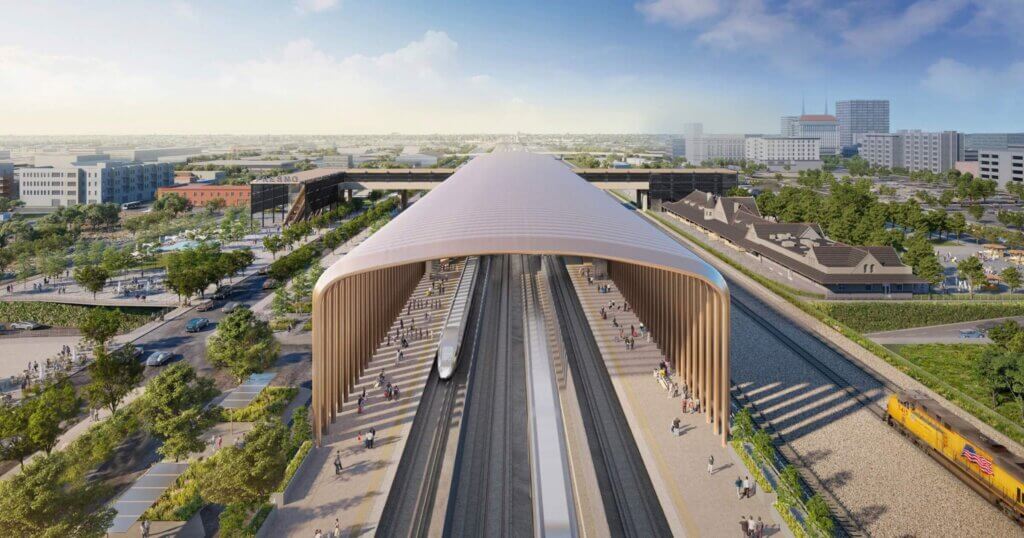
- Location: California, United States
- Year completed: 2030
- Typology: Transportation & Infrastructure
California High-Speed Rail can expect expansion by four new stations, including the Merced, Fresno, Kings Tulare, and the Bakersfield station. These stations will be design models for future stations along the San Francisco, Los Angeles/Anaheim system. The Merced station will incorporate a new pedestrian bridge, connecting downtown with the station concourse and a flexible outdoor plaza. The Fresno station will seamlessly connect downtown LA and Chinatown.
Kings Tulare station will provide a seamless experience for riders arriving by car, bicycle, or bus. Meanwhile, the Bakersfield station will connect Los Angeles and Anaheim to the south and feature shaded outdoor spaces and recreation areas. Foster + Partners anticipates the first line will be operational in 2030.
9. BWDC Residential Tower
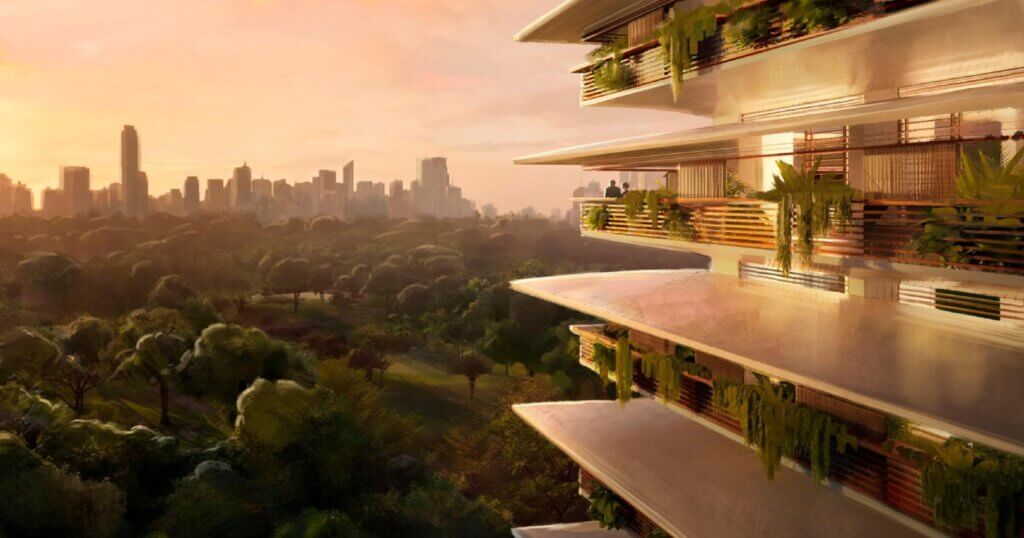
- Location: Manila, Philippines
- Year completed: 2026
- Typology: Residential
Manila’s BWDC Residential Tower is the newest luxury residential building in Manila, blending the city’s traditional veranda lifestyle with more modern, supertall living. This project leverages a design strategy made to respond to Manila’s intense weather events, mitigating humidity and heat through passive design. The tower is 45 floors high, with 43 units featuring wraparound terraces that span an entire floor each.
The exterior windows are operable and designed to maintain cross ventilation, while the deeply recessed windows reduce glare and minimize solar heat gain. A centralized chilled water supply system also supports low-energy cooling during peak heat periods. The edges of the project’s site feature shaded green spaces for residents and visitors to enjoy nature.
10. South Sabah Al-Ahmad Masterplan
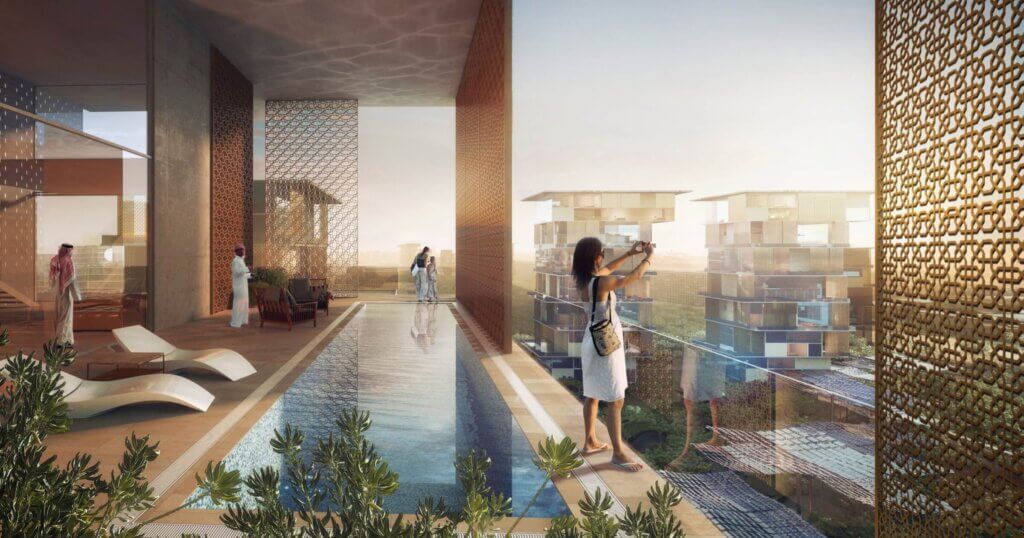
- Location: Kuwait City, Kuwait
- Year completed: 2039
- Typology: Urban design
Kuwait’s new urban core is set for completion as part of the South Sabah Al-Ahmad Masterplan just before 2040. This project is a city in itself, and will be home to roughly 280,000 residents, creating 145,000 new jobs, including blue-collar work, healthcare, education, and more. The city will be made from ten neighborhood clusters around a central business district, while a ring of industrial buildings shapes the border.
The central area will feature a museum, stadium, university, and a major city park. Greenspaces will run among the clustered neighborhoods, each featuring various housing topologies, including high-density apartments and patio houses. The pilot neighborhood nearest completion will feature rooftop photovoltaic installations as part of the overarching sustainability initiative.
Like this and want more like it? Follow us on LinkedIn and subscribe to our newsletter for spotlights on top global project developers and architects.
